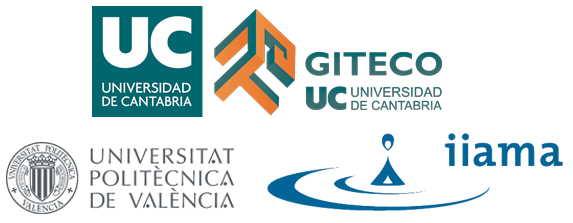
SUPRIS
(BIA2015-65240-C2-1-R y 2-R MINECO/FEDER,UE)
Survey
Survey on green roofs (once done, you can send it to rodrighj@unican.es. Thank you for your cooperation).
Summary
Due to the need to adapt our cities to climate change, the transformation of both urban pavements and buildings’ roofs is essential. Coordinated Project " Permeable Resilient, Smart and Sustainable Urban Surfaces (SUPRIS)", proposed in cooperation between the Research Group on Construction Technology of the University of Cantabria (GITECO-UC) and the Institute of Water and Environmental Engineering of the Polytechnic University of Valencia (IIAMA-UPV), has as main goal to do research for the development of the necessary knowledge to join together the four fundamental characteristics that an urban surface should offer: permeability, resilience, intelligence and sustainability.
Permeable urban surfaces are source control techniques included in the Sustainable Urban Drainage Systems (SUDS). The main problem they present is clogging over time. Therefore, this line needs more research, creating a new experimental device that allows testing all type of surfaces under different weather conditions and pollution loads. With the experimental results, a mathematical model will be calibrated and validated to obtain the surface response to different rainfall patterns and pollution scenarios.
To ensure that permeable urban surfaces are also resilient, a comprehensive risk analysis will be carried out to identify and assess the major threats to address in the future. Later laboratory tests on the main construction materials used on the surfaces of our cities will be made by changing the methodologies in an attempt to measure their resilience to extreme events of precipitation and temperature. Then complete sections will be built and the interactions between different materials will be analyzed, characterizing the overall resilience in the laboratory and in experimental areas already built.
In addition to the technical advantages of permeable and resilient urban surfaces, there are many other benefits, among them the environmental and ecosystem services obtained with their construction. These additional benefits should be evaluated and assessed to complete all the criteria in relation to the selection of the best available solution. In addition, there are still many institutional and governmental barriers that prevent the full implementation of these systems in our country. Therefore, it is essential to develop intelligent governance mechanisms that enable stakeholders and decision makers to include the developed new sections in its policy.
Finally, to ensure sustainability of the developed solutions, first the need to create a new sustainability indicator that allows with a GIS, to locate the priority action areas in a city, also analyzing risk levels will be assessed. In addition, various maintenance programs will be explored by optimizing the selection of equipment and planning. Finally, multi-criteria analysis tools will be used to combine all the variables and help to decide in each particular case the most suitable Permeable, Resilient, Smart and Sustainable Urban Surfaces (SUPRIS).